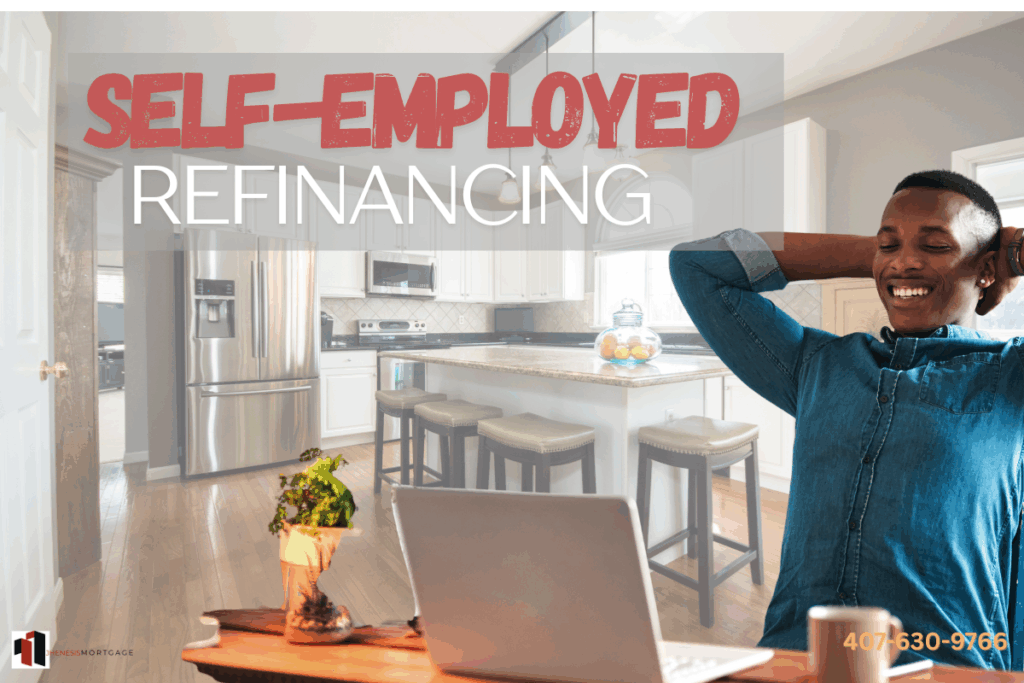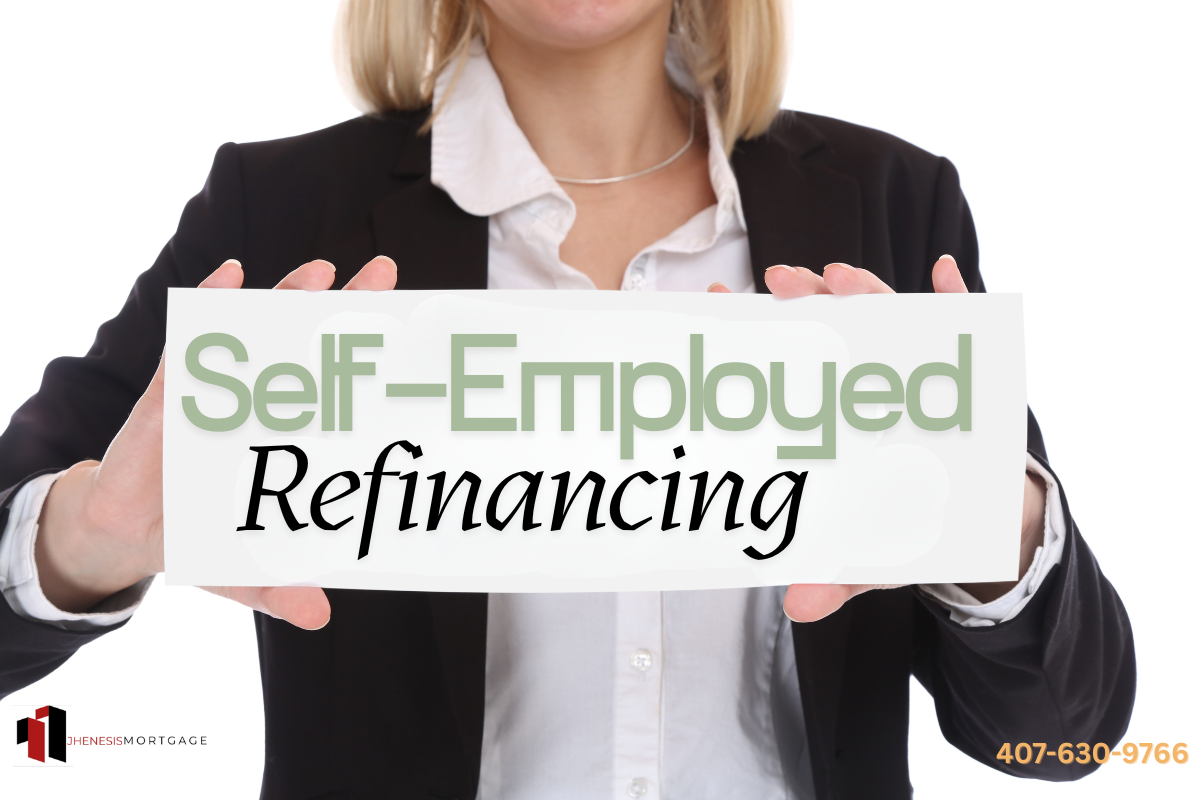Are you a self-employed entrepreneur in Central Florida juggling business growth with homeownership dreams? Refinancing your mortgage could lower your rates, tap into equity, or simplify payments—but for self-employed borrowers, it’s often a steeper climb than for W-2 employees. In this guide, we’ll break down the self-employed mortgage refinance challenges in Central Florida, why they exist, and the easiest paths forward. Whether you’re a freelancer in Orlando or a small business owner in Tampa, understanding these hurdles empowers you to act.

If you’re ready to simplify the process, keep reading for actionable tips and proven options tailored to sunny Central FL.
The Core Challenges: Why Refinancing Feels Like Climbing Everest for Self-Employed Borrowers
Self-employment offers freedom, but it complicates mortgage refinancing due to lenders’ need for stability and proof of income. Traditional lenders prioritize predictable W-2 income, leaving gig workers, consultants, and business owners facing extra scrutiny. Here’s why it’s tough—and how it hits harder in Florida’s dynamic market.
1. Irregular or Unverifiable Income Streams
Lenders crave consistency. Self-employed income can fluctuate with seasons, clients, or economic shifts, making it hard to project future earnings. In Central FL’s tourism-heavy economy, this is amplified—think Orlando’s event planners or Tampa’s contractors weathering off-seasons.
- Key Issue: Without steady pay stubs, banks rely on tax returns, which often show lower net income after deductions.
- Impact: Your adjusted gross income (AGI) might look smaller than your actual cash flow, raising red flags for default risk.
2. Tax Deductions That Backfire
As a savvy business owner, you deduct everything from home offices to mileage. Great for taxes, but it slashes your reported income on Schedule C or K-1 forms. Lenders use two years of tax returns to average income, potentially disqualifying you if it dips below qualification thresholds.
- Florida Twist: With no state income tax, FL self-employed folks still face federal scrutiny, but rising property values in areas like Lake County mean higher loan amounts—and stricter reviews.
3. Lengthy Documentation and History Requirements
Expect more paperwork: two years of business tax returns, profit-and-loss statements, and sometimes 1099s or business bank statements. Newer self-employed (under 24 months) face even steeper barriers, as lenders want proof your venture is sustainable.
- Scrutiny Factor: Post-pandemic rules, like Fannie Mae’s three-month business bank statement mandates, add layers for self-employed applicants.
These hurdles can delay approvals by weeks and spike stress levels. But don’t despair—non-traditional loans are game-changers.
Easiest Mortgage Options for Self-Employed Borrowers in Central Florida
The good news? Central FL’s competitive lending scene offers flexible, self-employed-friendly programs that bypass rigid W-2 rules. Focus on non-QM (non-qualified mortgage) loans, which use alternative income verification. Here’s a breakdown of the top easiest options, ranked by accessibility:
| Loan Type | Key Features | Ideal For | Central FL Availability |
|---|---|---|---|
| Bank Statement Loans | Use 12-24 months of personal/business bank deposits to qualify (no tax returns needed). Averages 50-100% of deposits as income. | Freelancers with high cash flow but low reported earnings. Rates: 0.5-1% above conventional. | Widely offered by FL lenders like NASB and local brokers; min. credit 620, 10-20% down. |
| Profit & Loss (P&L) Loans | Analyzes business financials for income; flexible on deductions. Often pairs with DSCR (debt service coverage ratio) for investors. | Small business owners with solid books. Easier approval than full docs. | Popular in Orlando/Tampa via non-QM specialists; up to 90% LTV. |
| FHA Streamline Refinance | Minimal paperwork; no income re-verification if you’re current on payments. Self-employed OK with basic docs. | Existing FHA homeowners seeking rate drops. Low fees, fast close (30 days). | Backed federally; easy access via FL credit unions like Seacoast Bank. |
| VA IRRRL (Interest Rate Reduction Refinance Loan) | Streamlined for vets; skips full income check. Self-employed vets qualify easily. | Military self-employed in Central FL bases like MacDill AFB. No appraisal often. | VA-approved lenders statewide; 0% down possible. |
| Asset Depletion Loans | Qualifies based on liquid assets (savings/investments) divided over time, ignoring income. | High-net-worth self-employed with irregular pay. | Niche but growing in affluent FL areas like Winter Park. |
These options shine in Central FL’s hot housing market, where median home values hit $400K+ in 2025. Pro tip: Pair with a local broker for personalized FL-specific perks, like no state tax advantages.
Pro Tips to Overcome Self-Employed Refinance Hurdles in Central FL
- Build Your Case Early: Gather 24 months of statements and a CPA letter affirming business stability.
- Boost Your Credit: Aim for 680+ FICO for better rates; self-employed with 720+ can snag 10% down.
- Shop Local: Central FL lenders understand seasonal income—avoid national banks’ one-size-fits-all approach.
- Time It Right: Refinance when rates dip (check Freddie Mac weekly); FL’s mild winters mean year-round flexibility.
With these strategies, what seems impossible becomes your next win.
FAQ: Top Questions on Self-Employed Mortgage Refinance in Central Florida
Based on common Google searches, here’s what fellow self-employed Floridians are asking:
How long do I need to be self-employed to refinance a mortgage?
Most lenders require at least two years of verifiable self-employment history via tax returns. Shorter histories (12 months) may qualify for bank statement loans, but expect higher rates.
Can self-employed borrowers refinance without tax returns?
Yes! Bank statement or P&L loans use deposits or business financials instead. Ideal if deductions tank your AGI—common for 70% of self-employed applicants.
What documents do self-employed need for mortgage refinance?
- Two years’ tax returns (personal/business).
- Profit/loss statements.
- 12+ months bank statements.
- Business license and CPA verification. FHA/VA streams cut this list in half.
Are there special refinance programs for self-employed in Florida?
Absolutely—FL banks like Seacoast offer tailored self-employed mortgages with bank statement options. Non-QM lenders dominate for flexibility.
How much down payment for self-employed refinance in Central FL?
10-20% equity typically needed for non-QM; FHA/VA can be as low as 3.5% or 0% for refinances. Higher credit unlocks better terms.
Ready to Unlock Your Refinance? Partner with Jhenesis Mortgage Today!
Don’t let self-employment roadblocks stall your financial freedom. At Jhenesis Mortgage, we specialize in seamless refinances for Central FL’s self-employed heroes—using bank statement loans, non-QM magic, and local know-how to get you approved fast. Imagine lower payments funding your next business venture!
Call now: 407-630-9766 | Email: [email protected] | NMLS#: 2532705 Schedule Your Free Consultation and let’s turn “hard” into “handled” in under 30 days. Your dream refinance starts here—what’s your first question?
Call/text me today for more information (407) 630-9766

